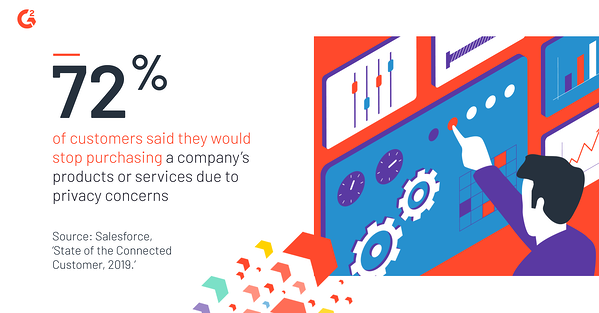Think about the last marketing message that impacted you. It probably wasn’t a generic ad like those you see on billboards splashed across the city. Maybe it was a promo code for the shoes you were thinking of ordering online or a personalized thumbnail on your Netflix account suggesting the movies you should watch next.
Personalized consumer experiences like this are common, and data is at its core. Data enables personalization, which ensures content delivered to consumers is relevant and interesting to them.
The world is becoming more data reliant, but this isn’t a bad thing. You just need to know how to manage it to ensure you respect your customer’s need for privacy while using that data to offer personalized marketing experiences.
Why does personalization matter in today’s climate, and what concerns do consumers have?
Consumers are making decisions about where to spend their resources every day, and they have an infinite supply of options. In a saturated, highly-competitive market, it’s difficult for brands to attract users and build customer loyalty.
To stand out from the crowd and make customers choose them over the competition, companies should work with a growth marketing agency to provide exceptional brand experiences. It’s not just about the products or services a company provides; customers buy from brands that treat them well. They are after customer engagements that are both conversational and specifically tailored to them.
Apparently, personalization is one of the best ways to offer excellent customer experiences. A 2018 study by Epsilon found that 80 percent of consumers are more likely to purchase from a brand that offers personalized experiences. A lack of personalization drives customers away, with 74 percent of consumers saying they are frustrated when they receive irrelevant content, according to data from Smart Insights.
Personalization provides customized experiences that bring relevant experiences to customers. It’s about creating an environment where the customer feels valued. Technology has made it possible for brands to collect valuable customer information for personalized marketing. From the collected data, they can learn their customer’s behaviors and interests and use this information to develop highly personalized marketing content that the customers desire.
Our blog, Why Does Your Growth Marketing Strategy Need Personalization?, explains in detail why brands should offer personalized experiences to their customers.
While technological advancements have made it possible for brands to leverage the power of marketing personalization, it has led to concerns about consumer privacy. The privacy concerns include data sharing, distrust in safeguards, a sense of being watched, and intrusive ads.

Figure 1: Consumer privacy concerns. Source: Salesforce
A study found that more than half of the consumers are happy to share their personal information, provided it’s used in ways that benefit them. 72 percent of consumers said they’d stop purchasing from a company because of data breaches. As a result, marketers must think about how to provide meaningful marketing services without compromising the safety of customer data.
How to address concerns about privacy
Here are the best practices for personalization and data privacy that brands can apply to put their clients at ease and still make the best marketing moves.
1. Know the privacy principles of your area and the areas that your business serves
The first thing you need to do is understand the data governance policies in your industry and region. The details of data security and privacy often vary by industry, and the local or regional regulator holds this information. For example, consumer and retail businesses cannot hold customer data for more than 13 months, which is enough to learn customer purchase patterns through holidays and seasons. Auto retailers often hold data for a long period, which reflects the longer time between purchases.
European countries and those with a global presence must adhere to the General Data Protection Regulation (GDPR) to give citizens more transparency and control over their data.
2. Structure the relationship between personalization and privacy by showcasing their co-dependence and inaccessibility by outsiders
You need data to personalize marketing campaigns, but this should not be at the expense of eroding customer privacy. The relationship between personalization and privacy should be symbiotic to assure your customers that their private data will be used in the right way. Determine what data you will be capturing and the requirements for accessing and using that data. Also, let them know that outsiders cannot access their data.
This refined approach will make customers trust your brand and help you provide optimal customer experiences.

3. Have clear consent guidelines
The volume of personal data that’s being collected by companies has been increasing steadily. Customers recognize that the collected data will improve their shopping experience. Still, many are frustrated with the lack of options when it comes to determining to what extent their data is harvested in various online ecosystems.
Enterprises should have clear consent guidelines that specify what customer data is being collected and how it will be used. Brands should give customers options to tweak their privacy preferences and even withdraw consent if they feel their data is not being used properly.
4. Use data to enhance customer experiences
Your main aim for collecting data should be to enhance the customer experience. The data you collect should empower you to know your consumers’ tastes, preferences, and whereabouts. Use this information in your content marketing campaign to create meaningful connections with your consumers.
Remember to stay in context and only send communication relevant to your consumers at that particular time.
5. Ensure that you have a watertight privacy policy – one that is created by legal, PR, and compliance personnel
What is a privacy policy? A privacy policy is a public statement that details how the owners of a website collect, store, and utilize the data provided by its users. Any website that tracks and gathers user data should have a privacy policy.
Get the help of legal, public relations, and compliance advisors to create a watertight privacy policy that assures your visitors of the safety of their data. Specify the role data privacy plays in enhancing business operations to keep your customers at ease when they’re interacting with your online assets.

6. Train your staff on ethical data use
Your staff has a role to play in enhancing data governance. They should use it in a privacy-compliant way while ensuring outsiders cannot access sensitive customer data.
Take the time to train them on ethical data use. Set clear company guidelines on how the staff should handle and protect customer data. This approach places data protection at the center of your company’s value proposition to customers by ensuring your security and privacy standards are met and.
7. Establish best practices for transparency and communicate them
The days of customers blindly trusting companies to safeguard their data are over. Customers want full transparency of how their data will be used, which is also one of the major principles of the GDPR privacy policy.
Therefore, brands must state clearly how they intend to use the data they collect from their customers. They should do so in easy-to-understand terms to make it easy for consumers to understand what’s being said.
8. Partner with reputable payment companies
Technology development has created opportunities for cybercriminals. As an online business, you need to offer the highest payment security level to assure customers that their private data is safe.
Businesses that sell products and services online should work with reputable payment companies to receive payments from clients. Processing payments should be quick and easy, but this shouldn’t be at the expense of data privacy. The payment gateway should be secure to prevent breaches in security.

9. Be as non-intrusive as possible – collect only that which will benefit the customer
When collecting data, limit your efforts to the data sets that will improve your ability to offer specific experiences that will benefit the customer. If you don’t need information about your customer’s movie preferences to improve your marketing campaigns, don’t ask them to provide you with this data.
Don’t collect every piece of data just because you can. Customers don’t like this, and they will opt out of your marketing campaigns when they notice your data collection efforts are becoming intrusive.

The complete set of content tips
Content marketing makes the world a more engaging place, and without it, you’re risking incredible engagement and conversion opportunities. Get all of the knowledge you need with our insider resources that’ll tell you how to make the most out of your content production – Content Marketing Made Easy: Your Complete Handbook.
Generic marketing communications don’t work anymore. Customers want marketing experiences tailored to them, and it’s by working with a content marketing agency that you’ll understand their behaviors, tastes, and preferences.
Personalized marketing is the future, and privacy should be one of your biggest focuses. Consumers are happy to share their personal data to receive customized experiences, but they need assurances that their data will be used properly. The team at Growth Marketing Genie can help you make campaigns that balance the best of both.
Do you need help with your marketing strategy? Here are the best marketing tips that will set you up for explosive growth.

Book in a Free Consultation
